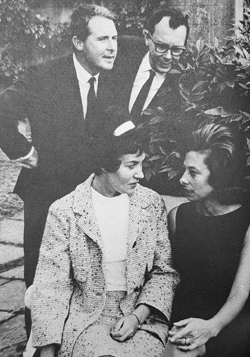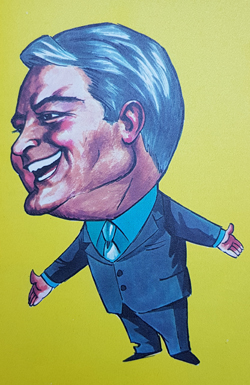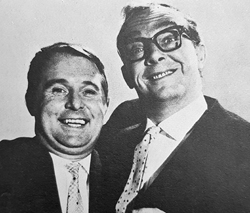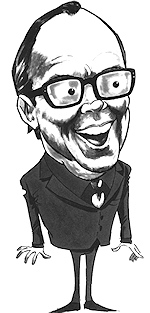The (KP) Morecambe and Wise Story
1970 Article

Eric, Ern and their wives

Ernie cartoon from the book

Eric and Ernie

Eric cartoon from the book
On that train were Eric Morecambe and Ernie Wise, two young showbiz hopefuls, chaperoned by Mrs. Sadie Bartholomew, Eric’s mother. It had been a tiring day and Sadie felt like a nap. She couldn’t sleep because of the noise her two charges were making.
“Can’t you find something to do?” she enquired.
“Why don’t you rehearse some gags for a double act?”
That did it. Eric and Ern took her advice, and so Morecambe and Wise were born.
They were only 14. What did the future hold for the tall, tired-looking Eric Morecambe who began his entertainment apprenticeship by winning talent contests in his home town? And could the shorter, stockier, almost cocksure Ernie Wise hope to make the big time after partnering his father in a comedy song-and-dance act in the tough breeding ground of the Yorkshire working men’s clubs?
The future, it seemed, held nothing at all. After nurturing the act for three years or so, they were called up. Eric was sent down the mines as a ‘Bevin Boy’ and Ernie joined the Merchant Navy.
They were on their own again. They had no idea when or where they would meet or whether that young and burgeoning partnership would blossom into maturity. But fate was to take a hand, or could it be that the Almighty’s sense of humour decreed that these two great comic talents should be joined for all times?
After all, some magic had been spun to throw them together at the Nottingham Empire in 1939 when they were both in Jack Hylton’s show ‘Youth Takes A Bow.’ They were individual acts, but Ernie was six months older and, in his cheeky way, called Eric ‘Sonny.’
One night Eric said to his mother: “I don’t like Ernie Wise, Mum. He calls me Sonny.”
But a few days later Eric admitted: “I think I like Ernie Wise after all, Mum. He bought me a bar of chocolate today!”
So began the double act and friendship that was to make this unpretentious pair superstars in an age when immense talent is hard to find. But would the chemistry that brought them together have remained intact had they not worked a long, unremitting, and often un-rewarding apprenticeship?
For twenty years they slogged away in an effort to get to the top. And they re-formed after their wartime separation, their partnership grew in strength. A lesser bond might well have crumbled during the lean laughless years of the late forties and early fifties.
The reunion was brought about by a circus showman called Lord John Sanger. He wanted a straight man to feed a comic he had engaged. Eric applied, got the job, and found that the comic was Ernie Wise. A coincidence, to say the least, that would be unbelievable if it formed part of the plot of a film or stage musical!
Circus life was hard going, and when the tour ended Eric and Ern split up once again. There was one consolation for Ernie: he met a girl called Doreen Blythe, one of the dancers. They’ve been Mr. and Mrs. Wise for years now. Later, Eric met a dancer called Joan Bartlett in a show in Edinburgh and she became his wife.
They re-formed in London to embark at last on that long apprenticeship. It called for weeks of touring in tatty theatres, providing the comic relief in nude shows, and being able to cope with long spells out of work. They worked at the Windmill Theatre without success and took whatever job came their way.
Recalls Ernie: “We pinched material from wherever we could. Laurel and Hardy were our idols, still are. Then we used a lot of Abbott and Castello’s material. We were a mixture in those days, but somewhere there would be a little original thought and this is what developed.”
Says Eric: “Gradually, we built up a technique which improved as we toured in twice-nightly variety. We just had to break through for we could only just get by on the money we were earning. When we were out of work, it was just a bare existence. Radio was the thing in those bleak years of the early fifties. Many big names were being made through being on the radio regularly.”
They managed to get a ‘Workers Playtime’ broadcast and others followed. Then came a breakthrough. They were given their own radio series from the North – “You’re Only Young Once.” It was a success, and they did another three series.
Television was the next obvious medium. This was where stars were made. In 1953, on the strength of one show, they were given their own series. It was called “Running Wild”.
The press slammed it and Eric and Ernie were heartbroken. They felt they would never recover from the blow. But, looking back on that series, Eric recalls: “We didn’t think it was such a bad show. We were new to television and we just did as we were told. And we hadn’t developed the style we use today.”
But even that ‘disaster’ didn’t diminish the appeal of Morecambe and Wise. They found they could command more money in the theatres, they began to top bills – yet that final breakthrough still eluded them.
Television was now having its effect upon theatres. Now there was a second channel and it became more important than ever for the duo to make an impact. And so, Eric and Ernie took a break from the British scene and went to Australia for six months with their wives. When they returned they decided to make an all-out attack for some television coverage. They were tired of the eternal touring and now Eric and Joan had two children, Gail and Gary. Both partners wanted to put down permanent roots.
So Eric and Ernie began their campaign for maximum TV exposure. They appeared as guests on other people’s shows and eventually worked their way up to the top TV variety show of the era – ‘Sunday Night at the London Palladium’. In one year they did six of these shows and so made the run-in to a series of their own.
That series, the most important of their lives, coincided with a strike by members of equity, a trade union for television and theatrical performers. But, as members of the then Variety Artistes Federation (the other performers union which wasn’t on strike), Eric and Ernie weren’t affected.
Since then the two unions have joined forces under the name of equity, but at the time it meant that the comedians had to carry the series on their own, devoid of dancers or guest stars.
It was a big it with viewers and, at last, the comedians realised that having too many people in their shows had spoilt their previous series. They topped TV popularity polls as series after series won wide acclaim in this country and throughout the world.
Now the film moguls became interested in the two-some and they made three films for the Rank Organisation – “The Intelligence Men”, “That Riviera Touch” and “The Magnificent Two”.
They worked at high pressure – TV, Cabaret, and club dates, summer shows, and pantomimes. They did flying visits to New York to appear on major TV shows. It was non-stop work.
The two raw young hopefuls who had met on that chilly day in Nottingham had at last made it big time – but without any time to enjoy a home life in the beautiful homes they had bought from the results of their own rich, finely-honed talents.
Inevitably, the strain of working seven days a week under constant pressure took its toll, and Eric fell ill. It meant that all work had to stop for a few months.
“That illness was a saving grace for both of us,” recalls Eric. “It made us see our folly in working at such a pace. We saw that we were missing so much, so we decided to concentrate on one thing at a time.”
Now Eric and Ernie spend most of the year on their television shows. They work steadily and painstakingly on making their shows into works of art so that viewers are conscious of watching something quite exceptional and historic in mass entertainment.
But they have other plans – such as making another film; embarking on occasional forays into the provinces for one- and two-night stands as Britain’s biggest box-office attractions, and writing an autobiography.
Morecambe and Wise have become a legend in their own lifetimes and they intend to use those lives to the full.
© KP 1970